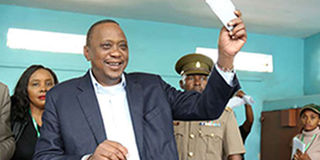Raging political row burden of democracy

President Uhuru Kenyatta casts his ballot at Mutomo Primary School polling station in Kiambu on October 26, 2017 during the repeat presidential election that was boycotted by his main challenger, Raila Odinga. Raging political row is burden of democracy. PHOTO | RAPHAEL NJOROGE | NATION MEDIA GROUP
What you need to know:
Those who voted for or against President Kenyatta in Thursday’s poll most likely did so because of his main opponent’s unclear game plan and his doggedness.
They must have read Mr Odinga’s sudden withdrawal from the poll as a guerrilla tactic to push Mr Kenyatta to the negotiation table.
On a larger canvas, Mr Odinga’s failure to initiate comprehensive democratic and constitutional reforms might have cost him the admiration of moderates, hawks, doves and leftists.
Indian political thinker Pratap Bhanu Mehta’s book titled, The Burden of Democracy, aptly reflects the ongoing electoral impasse in Kenya.
The magnitude of the perilous situation was summed in the Supreme Court of Kenya judgment: “We find that the 2017 presidential election was neither transparent nor verifiable.”
This statement sent chills down the spines of Kenyans. Indeed, a repeat of the 2007 post-election mayhem is looming again.
The court strongly reprimanded the officials of the Independent Electoral and Boundaries Commission (IEBC), holding them squarely responsible for the botched-up elections.
ELECTION LAWS
To add insult to injury, Jubilee Party lawmakers soon literally engaged in a parliamentary coup to hurriedly pass the Election Laws (Amendment) Bill, 2017 in the absence of the opposition members.
The controversial law is meant to serve the interests of President Uhuru Kenyatta’s party.
Though the apex court ordered a repeat of the presidential poll, the IEBC appeared compromised and in a state of utter disarray.
One commissioner, Dr Roselyn Akombe, fled the country and resigned, citing frustration and security concerns.
Chairman Wafula Chebukati finds himself caught up in a crossfire between Jubilee and the opposition.
WORLD LEADERS
The standoff that culminated in Nasa presidential candidate Raila Odinga’s withdrawal from the October 26 poll, has attracted the attention of international institutions and governments.
His associates have also questioned the silence of Kenya’s long standing allies, the US and UK governments.
Ignoring reported electoral discrepancies, world leaders had been quick to congratulate President Kenyatta on his “victory” that was later nullified by the Supreme Court of Kenya.
Chinese President Xi Jinping said: “During your participation in the Road and Belt Forum for International Cooperation in Beijing last May, we had an in-depth exchange of views on the development of bilateral relations and reached an extensive consensus.”
COOPERATION
Israeli Prime Minister Benjamin Netanyahu called Mr Kenyatta and pledged to facilitate the continuation of cooperation in agriculture and the search for security solutions.
Israel has since a year been trying to push President Kenyatta to back its bid for an observer status at the African Union.
The general view is that the support by some of international powerhouses prompted the Kenyatta administration to insolently attempt change the electoral goalposts midway by amending the laws.
One wonders whether the votes of the millions of Kenyans really matter when they need to.
VOTED
Those who voted for or against President Kenyatta in Thursday’s poll most likely did so because of his main opponent’s unclear game plan and his doggedness.
They must have read Mr Odinga’s sudden withdrawal from the poll as a guerrilla tactic to push Mr Kenyatta to the negotiation table.
But political pundits see his decision as meant to enable him to maintain his legacy as a veteran political fighter for rights, having filed the petition that culminated in the the historic Supreme Court ruling nullifying a rigged presidential election, which is a new and rare occurrence in Africa and the rest of the world.
On a larger canvas, Mr Odinga’s failure to initiate comprehensive democratic and constitutional reforms might have cost him the admiration of moderates, hawks, doves and leftists.
It has substantially eroded his political stature and the confidence of his supporters and sponsors, making his desire to become the president even more unlikely.
Mr Raghib is a commentator on eastern African socio-political affairs. [email protected]




